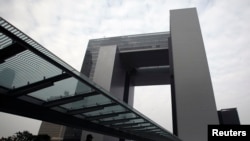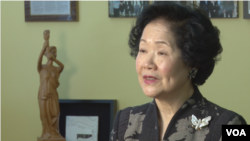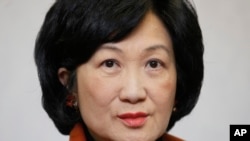WASHINGTON —
Hong Kong's government is receiving final submissions of public proposals for how to introduce universal suffrage for the election of the autonomous Chinese territory's next leader in 2017.
Officials will end the five-month consultation exercise on Saturday, and will release their own electoral reform plan sometime in the next year. That plan must win the approval of two-thirds of Hong Kong's legislators before it can take effect for the 2017 election of the chief executive, the city's top job.
The Hong Kong government says it wants to present lawmakers with a document reflecting a public consensus that will advance the territory's democratic development.
But the consultation period has shown that wide gaps remain between the city's two main political camps: one that demands a faster pace of democratization, and the other that advocates a more conservative approach favored by the government and its political superiors in Beijing.
Hong Kong's constitution, or Basic Law, says chief executive candidates should be nominated by a "broadly representative nominating committee in accordance with democratic procedures." Such a body likely would be based on an existing, largely pro-government committee that has elected all of the territory's leaders since 1997, when Britain returned Hong Kong to China.
Pro-democracy activists fear the government will propose forming a nominating committee also dominated by pro-establishment members who will block the candidacies of anyone deemed insufficiently loyal to Beijing.
Lobbying campaign
Veteran pro-democracy campaigners and former lawmakers Anson Chan and Martin Lee raised that concern in meetings with U.S. Vice President Joe Biden and members of Congress in Washington in early April.
In an interview with VOA at Washington's National Endowment for Democracy, Chan accused Beijing officials of trying to exert undue influence over the electoral reform process. In recent months, those officials have said chief executive candidates must "love the country (China) and Hong Kong," a controversial phrase not explicitly stated in the Basic Law.
"The bottom line is, we want credible proposals that give voters a genuine choice," said Chan, Hong Kong's former chief secretary, or number two official. "The proposals should not set down unreasonable restrictions to prevent people from standing for election, and should not rule out people of different political affiliations."
She also said Chinese "interference" is eroding the "core values" of Hong Kong, an international financial center whose residents enjoy greater freedoms of the press, religion and assembly than citizens of mainland China.
"We share these core values with the United States and many other trading partners," Chan said. "And if we can no longer maintain these core values, then our business prospects at the end of the day will be adversely affected."
Different approaches
Other members of Hong Kong's pro-democracy camp also want a "genuine" choice of chief executive candidates, but disagree about how to achieve that.
The most reform-minded pan-democrats say the nominating committee must approve any candidate who wins significant public nominations from voters or established political parties.
Chan's Hong Kong 2020 group advocates a more modest system in which voters cannot nominate candidates directly, but can elect about one-quarter of the members of the nominating committee. The other members would be chosen by various industry group representatives, many of whom favor the establishment. Up to now, those representatives have chosen almost all members of previous chief executive election committees.
Chan and her fellow activist Lee have faced strong criticism for lobbying U.S. officials to support their cause. Chinese state media have accused the pair of trying to invite foreign intervention in China's affairs.
More criticism comes from Hong Kong's pro-establishment camp.
Backlash grows
New People's Party leader and lawmaker Regina Ip, Hong Kong's former security chief, told VOA that the actions of Chan and Lee are "totally inappropriate."
"If they want constitutional change, they should lobby our own government and the authorities in Beijing," said Ip, speaking by phone from Hong Kong.
"The opinions of big countries such as the United States and Britain are becoming increasingly irrelevant, because Beijing is getting more confident by the day and is very sensitive to external interference. So trying to leverage external forces to pressure Beijing would send the wrong signals and really hurt our democratic cause."
Ip said Chinese officials who comment on Hong Kong's reform debate only have stated the obvious - that nominations of chief executive candidates must conform to the Basic Law, which does not specifically give the public a say in the process.
Facing realities
"The democratic model under the Basic Law is a limited one because we are a part of China, we are not an independent political entity," Ip said. "The constitution was designed to preserve the capitalist economy of Hong Kong, so that we would not become too populist or anti-China."
Ip's party says Hong Kong can have a competitive leadership election with a nominating committee modeled on the previous election committee, but whose members are chosen by an expanded group of representatives from a wider variety of social sectors, such as the elderly, youths, women and minorities.
But many Hong Kongers are pessimistic about democratic reform.
A survey released Wednesday by the Hong Kong Transition Project an independent research group, shows that 72 percent of respondents with an opinion have little or no faith in the government implementing a fair system for the 2017 election.
LISTEN: VOA Interviews with Regina Ip and Anson Chan
Anson Chan tells VOA’s Michael Lipin what she thinks of Beijing’s role in the dispute about electoral reform.
VOA’s Michael Lipin asks Regina Ip what she thinks of Anson Chan and Martin Lee’s lobbying visit to Washington.
Officials will end the five-month consultation exercise on Saturday, and will release their own electoral reform plan sometime in the next year. That plan must win the approval of two-thirds of Hong Kong's legislators before it can take effect for the 2017 election of the chief executive, the city's top job.
The Hong Kong government says it wants to present lawmakers with a document reflecting a public consensus that will advance the territory's democratic development.
But the consultation period has shown that wide gaps remain between the city's two main political camps: one that demands a faster pace of democratization, and the other that advocates a more conservative approach favored by the government and its political superiors in Beijing.
Hong Kong's constitution, or Basic Law, says chief executive candidates should be nominated by a "broadly representative nominating committee in accordance with democratic procedures." Such a body likely would be based on an existing, largely pro-government committee that has elected all of the territory's leaders since 1997, when Britain returned Hong Kong to China.
Pro-democracy activists fear the government will propose forming a nominating committee also dominated by pro-establishment members who will block the candidacies of anyone deemed insufficiently loyal to Beijing.
Lobbying campaign
Veteran pro-democracy campaigners and former lawmakers Anson Chan and Martin Lee raised that concern in meetings with U.S. Vice President Joe Biden and members of Congress in Washington in early April.
In an interview with VOA at Washington's National Endowment for Democracy, Chan accused Beijing officials of trying to exert undue influence over the electoral reform process. In recent months, those officials have said chief executive candidates must "love the country (China) and Hong Kong," a controversial phrase not explicitly stated in the Basic Law.
"The bottom line is, we want credible proposals that give voters a genuine choice," said Chan, Hong Kong's former chief secretary, or number two official. "The proposals should not set down unreasonable restrictions to prevent people from standing for election, and should not rule out people of different political affiliations."
She also said Chinese "interference" is eroding the "core values" of Hong Kong, an international financial center whose residents enjoy greater freedoms of the press, religion and assembly than citizens of mainland China.
"We share these core values with the United States and many other trading partners," Chan said. "And if we can no longer maintain these core values, then our business prospects at the end of the day will be adversely affected."
Different approaches
Other members of Hong Kong's pro-democracy camp also want a "genuine" choice of chief executive candidates, but disagree about how to achieve that.
The most reform-minded pan-democrats say the nominating committee must approve any candidate who wins significant public nominations from voters or established political parties.
Chan's Hong Kong 2020 group advocates a more modest system in which voters cannot nominate candidates directly, but can elect about one-quarter of the members of the nominating committee. The other members would be chosen by various industry group representatives, many of whom favor the establishment. Up to now, those representatives have chosen almost all members of previous chief executive election committees.
Chan and her fellow activist Lee have faced strong criticism for lobbying U.S. officials to support their cause. Chinese state media have accused the pair of trying to invite foreign intervention in China's affairs.
More criticism comes from Hong Kong's pro-establishment camp.
Backlash grows
New People's Party leader and lawmaker Regina Ip, Hong Kong's former security chief, told VOA that the actions of Chan and Lee are "totally inappropriate."
"If they want constitutional change, they should lobby our own government and the authorities in Beijing," said Ip, speaking by phone from Hong Kong.
"The opinions of big countries such as the United States and Britain are becoming increasingly irrelevant, because Beijing is getting more confident by the day and is very sensitive to external interference. So trying to leverage external forces to pressure Beijing would send the wrong signals and really hurt our democratic cause."
Ip said Chinese officials who comment on Hong Kong's reform debate only have stated the obvious - that nominations of chief executive candidates must conform to the Basic Law, which does not specifically give the public a say in the process.
Facing realities
"The democratic model under the Basic Law is a limited one because we are a part of China, we are not an independent political entity," Ip said. "The constitution was designed to preserve the capitalist economy of Hong Kong, so that we would not become too populist or anti-China."
Ip's party says Hong Kong can have a competitive leadership election with a nominating committee modeled on the previous election committee, but whose members are chosen by an expanded group of representatives from a wider variety of social sectors, such as the elderly, youths, women and minorities.
But many Hong Kongers are pessimistic about democratic reform.
A survey released Wednesday by the Hong Kong Transition Project an independent research group, shows that 72 percent of respondents with an opinion have little or no faith in the government implementing a fair system for the 2017 election.
LISTEN: VOA Interviews with Regina Ip and Anson Chan
Anson Chan tells VOA’s Michael Lipin what she thinks of Beijing’s role in the dispute about electoral reform.
VOA’s Michael Lipin asks Regina Ip what she thinks of Anson Chan and Martin Lee’s lobbying visit to Washington.







